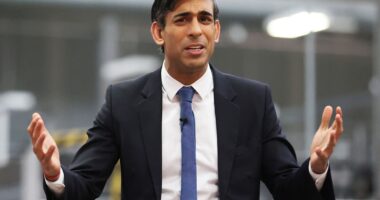

Voice of wisdom: Former PM Tony Blair
Hindsight is a wonderful thing. Looking at a trajectory of public finances, former PM Tony Blair argues that, if elected. Keir Starmer would confront a much worse economic situation than that which he inherited from John Major in 1997.
Deficits and debts mean that even the last of the Leftist forces in Starmer’s shadow cabinet are on a tight leash.
Deputy Labour leader Angela Rayner declined to defend the ‘triple lock’ on the state pension, arguing that her party would not make ‘unfunded’ promises. One knows what she means but as the UK’s state pension system is unfunded anyway her answer was gobbledegook.
Similarly, Labour’s energy overlord Ed Miliband has been put back in his box by shadow chancellor Rachel Reeves over the pledge to invest/spend £28billion a year in turning the UK into a green energy superpower. Budget constraints mean the investment will not be rolled out until halfway through the next parliament – if at all.
Labour is sensible to hold back on the fiscal promises, given that the UK’s net debt to output or GDP ratio, as measured by the IMF, is a projected 95.1 per cent this year. The opposition blames the Tories for this.
Yet closer examination of the public finances since 2007 shows that the crisis began in the aftermath of the great financial crisis, when Gordon Brown was PM and Alistair Darling the chancellor. In 2007, ahead of the banking bailout, the ratio of Britain’s net debt to GDP, was a German-like 37.19 per cent. By 2010, when the coalition took power, it had zoomed up to 66.9 per cent.
The combination of the banking bailouts and the ferocious downtown which followed sent the public finances haywire. Boom became bust.
Opposition parties love to talk about the evil of George Osborne’s austerity, and ‘fixing the roof’. Yet it was Labour’s mismanagement of the financial system which put Britain on the road to ruin. Austerity was all about steadying the ship.
The big bump in the national debt began with Covid. As the Office for Budget Responsibility opined during the crisis, in wartime the public finances must be there to take the strain. Sure, some money was wasted on PPE contracts and fraudulent loans. Yet despite Keir Starmer’s constant attacks and demands for more severe lockdowns the outcome, as we now know, is that the UK was not the worst for Covid deaths, as claimed, but bang in the middle of the European pack. Money well spent.
Just as the Government sought to steady the public finances along came President Putin’s war on Ukraine. The surge in energy prices and the hit to consumers had Labour and special interest groups baying for bail-outs to assist with the cost-of-living crisis.
Labour not only contrived to make it impossible for the money not to be spent but would have done more.
The unavoidable result is the towering debt, although it is still way below most of our G7 partners bar Germany.
Unfortunately, there is an act of self-harm which made matters worse. The Treasury together with the Bank of England overloaded the debt issue with bonds tied to inflation – ballooning the interest rate bill. Both Labour and Tory ministers have some responsibility for this. Nevertheless, it is time to be honest and recognise that the black hole in the public finances is the consequence of three, unrelated shocks.









